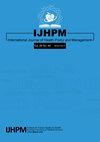DementiaNet 社区护理网络方法对入院率和医疗成本的影响:纵向队列分析
IF 3.1
3区 医学
Q2 HEALTH CARE SCIENCES & SERVICES
International Journal of Health Policy and Management
Pub Date : 2023-10-28
DOI:10.34172/ijhpm.2023.7700
引用次数: 0
摘要
背景:痴呆症患者越来越多地住在家里,他们的大部分医疗保健需求都依赖于初级保健提供者。医疗服务提供者之间的合作与沟通不畅可能会导致效率低下和患者预后恶化。需要采取创新策略来应对这一日益加重的疾病负担和不断上涨的医疗成本。DementiaNet 计划是荷兰一项针对痴呆症患者的社区护理网络方法,已被证明可以提高患者的护理质量。然而,人们对 DementiaNet 对入院风险和医疗成本的影响知之甚少。本研究弥补了这一知识空白。研究方法利用 2015-2019 年间 38525 名患者的医疗和长期护理报销数据,进行了纵向队列分析。主要结果是入院风险和年度医疗费用总额。采用混合模型回归分析来确定结果的变化。结果接受 DementiaNet 社区护理网络护理的患者在研究的所有入院类型(即医院、急诊病房、重症监护、危机和疗养院)中均显示出入院风险降低的总体趋势。此外,干预组的护理天数显著减少了 12%(相对风险 [RR] 0.88;95% CI:0.77-0.96)。总医疗费用方面没有发现明显差异。不过,我们发现总医疗费用的两个子元素都有影响,即每年的住院费用减少了 19.7% (95% CI:7.7%-30.2%),每年的初级保健费用增加了 10.2%(95% CI:2.3%-18.6%)。结论我们的研究表明,DementiaNet 的社区护理网络方法可以在五年的长期时间内降低痴呆症患者的入院风险。随之而来的是护理天数的减少和医院护理费用的节省,其节省的费用超过了增加的基础护理费用。痴呆症综合护理的这一改善支持了这些网络在更大范围内的实施和评估。本文章由计算机程序翻译,如有差异,请以英文原文为准。
Effects of DementiaNet’s Community Care Network Approach on Admission Rates and Healthcare Costs: A Longitudinal Cohort Analysis
Background: People with dementia are increasingly living at home, relying on primary care providers for most healthcare needs. Suboptimal collaboration and communication between providers could cause inefficiencies and worse patient outcomes. Innovative strategies are needed to address this growing disease burden and rising healthcare costs. The DementiaNet programme, a community care network approach targeted at patients with dementia in the Netherlands, has been shown to improve patient’s quality of care. However, very little is known about the impact of DementiaNet on admission risks and healthcare costs. This study addresses this knowledge gap. Methods: A longitudinal cohort analysis was performed, using medical and long-term care claims data from 38 525 patients between 2015-2019. The primary outcomes were risk of hospital admission and annual total healthcare costs. Mixed-model regression analyses were used to identify changes in outcomes. Results: Patients who received care from a DementiaNet community care network showed a general trend in lower risk of admission for all types of admissions studied (ie, hospital, emergency ward, intensive care, crisis, and nursing home). Also, the intervention group showed a significant reduction of 12% in nursing days (relative risk [RR] 0.88; 95% CI: 0.77– 0.96). No significant differences were found for total healthcare costs. However, we found effects in two sub-elements of total healthcare costs, being a decrease of 19.7% (95% CI: 7.7%–30.2%) in annual hospital costs and an increase of 10.2% (95% CI: 2.3%–18.6%) in annual primary care costs. Conclusion: Our study indicates that DementiaNet’s community care network approach may reduce admission risks for patients with dementia over a long-term period of five years. This is accompanied by a decrease in nursing days and savings in hospital care that exceed increased primary care costs. This improvement in integrated dementia care supports wider scale implementation and evaluation of these networks.
求助全文
通过发布文献求助,成功后即可免费获取论文全文。
去求助
来源期刊

International Journal of Health Policy and Management
Health Professions-Health Information Management
CiteScore
5.40
自引率
14.30%
发文量
142
审稿时长
9 weeks
期刊介绍:
International Journal of Health Policy and Management (IJHPM) is a monthly open access, peer-reviewed journal which serves as an international and interdisciplinary setting for the dissemination of health policy and management research. It brings together individual specialties from different fields, notably health management/policy/economics, epidemiology, social/public policy, and philosophy into a dynamic academic mix.
 求助内容:
求助内容: 应助结果提醒方式:
应助结果提醒方式:


